Lawmakers from opposites sides of the aisle want to sundown Part 230 of the Communications Decency Act, as a result of it has “outlived its usefulness.” Home Vitality and Commerce Committee Chair Cathy McMorris Rodgers and rating member Frank Pallone, Jr. have launched a bipartisan draft laws introducing their proposed invoice, which is in search of to render the supply ineffective after December 31, 2025. Within the op-ed piece the lawmakers wrote for The Wall Avenue Journal, they admitted that Part 230 “helped shepherd the web from the ‘you have obtained mail’ period into right this moment’s world nexus of communication and commerce.” Nonetheless, they stated that massive tech corporations are actually exploiting the identical legislation to “protect them from any duty or accountability as their platforms inflict immense hurt on People, particularly kids.”
They added that the lawmakers who beforehand tried to handle points with Part 230 did not succeed as a result of tech corporations refused any significant cooperation. Their invoice would compel tech corporations to work with authorities officers for 18 months to conjure and enact a brand new authorized framework to switch the present model of Part 230. The brand new legislation will nonetheless enable totally free speech and innovation, however it’s going to additionally encourage the businesses “to be good stewards of their platforms.” Rodgers and Pallone stated that their invoice will give corporations the selection between guaranteeing the web is “a secure, wholesome place for good” and shedding their Part 230 protections altogether.
Part 230 shields on-line publishers from legal responsibility in the case of content material posted by their customers. Firms like Meta and Google have repeatedly used it prior to now to get lawsuits dismissed, but it surely has come beneath intense scrutiny in recent times. Final yr, a bipartisan group of senators launched a invoice that may amend the part to require massive platforms to tug down content material inside 4 days in the event that they had been deemed unlawful by courts. One other bipartisan group additionally proposed a “No Part 230 Immunity for AI Act,” which seeks to carry corporations like OpenAI chargeable for dangerous content material, equivalent to deepfake pictures or audio created to damage any individual’s status.
This text comprises affiliate hyperlinks; in the event you click on such a hyperlink and make a purchase order, we could earn a fee.

